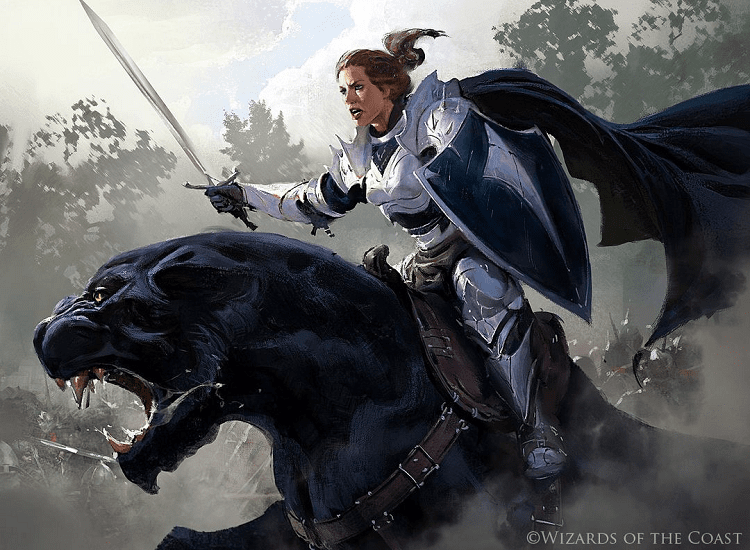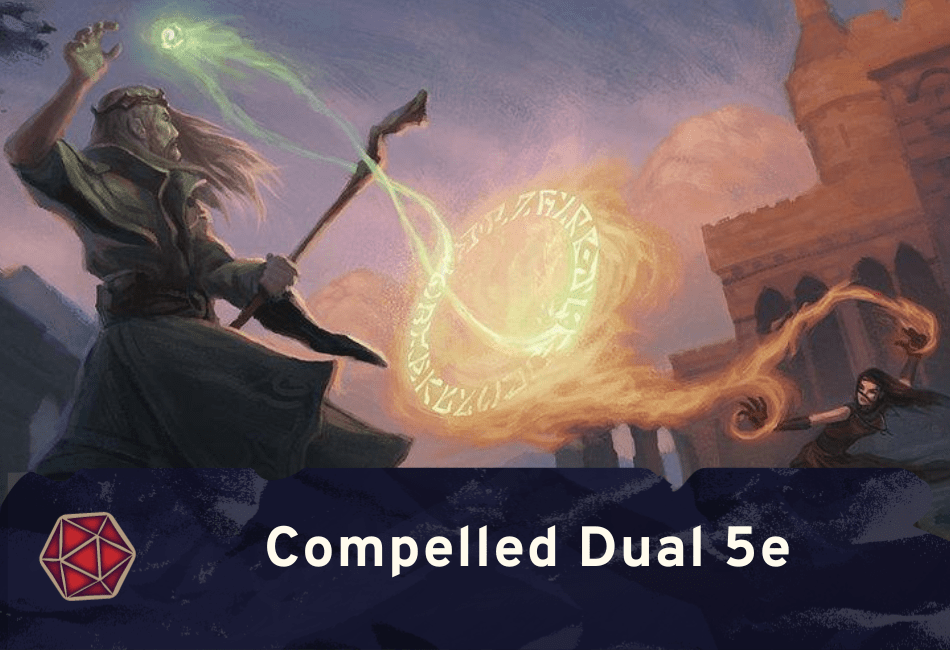There are some skills and abilities different classes have within Dungeons and Dragons 5e that allow you to become the main target of your enemies. This can spare your squishiest of teammates from being hit or draw attention away from Clerics and glass canon spellcasters.
Fighters have access to a maneuver called Goading Strike and Paladins have the spell featured in this Compelled Duel 5e guide. Both of these abilities are locked to their specific classes, meant to allow for both to defend their party members from the dangers of the enemy.
Unlike Fighters, however, Paladins are more likely to have higher Wisdom and thus, are more likely to succeed in their actions. Whether inside or outside of battle, Paladins of any oath can use their Bonus Action to protect their friends (we hope). But is it an ethical spell to use if you’re a good-aligned paladin?
Quick Answer
Compelled Duel is a Paladin-only spell. It is a first-level enchantment, cast as a Bonus Action. You can cast it on a single creature within 30 feet of you. Compelled Duel requires only the Verbal component. The targeted creature must roll a Wisdom save against your Spell Save DC.
On a failed save they are compelled to fight you, giving them disadvantage when attempting to attack others or restricting them to staying within 30 feet of you. Most good-aligned Paladins will probably only find use of this spell while inside of combat, whereas neutrally and evil-aligned Paladins will find a use for it anywhere and everywhere.
What is it Compelled Duel in 5e?
Compelled Duel is a first-level enchantment. I can be cast as a Bonus Action with a range of 30 feet. It only requires a verbal component – such as a spoken word or a taunt. This spell can last up to one minute, so long as you maintain concentration when casting it.
When casting Compelled Duel, the creature you target must make a Wisdom saving throw. On a failed save, they are compelled by your demand to fight you. On each of its turns, for the duration of the spell, it has a disadvantage when attacking someone, or something, other than you.
Each time it attempts to move into a space that is more than 30 feet away from you, it needs to succeed on a Wisdom save against your Spell Save DC. If it fails on the saving throw then your target’s movement is restricted for their turn. If it succeeds, however, then it can move freely.
This spell ends if you attack or target another creature, if you cast another spell on a different hostile creature, if the creature you targetted is damaged, or if you end further than 30 feet away from your target.
This places quite a restriction on how Compelled Duel can work in a battle, and how you can utilize it to its fullest extent – whether as a Dungeon Master or a Player.
Who Can Use Compelled Duel?

Unfortunately for any over-eager Fighters and Barbarians, the only class that has access to this first-level spell is Paladins. Unfortunately, Feats like Magic Initiate and Spell Sniper don’t give you access to the Paladin spells.
However, for Fighters, Barbarians, or anyone who feels like they absolutely must have this spell in their life, you can take a level of Paladin and gain immediate access to it.
There tends to be a common misconception concerning Paladins that you have to be bound to a deity of some sort to get your power – that just isn’t the truth. Although Paladins are commonly bound to a deity through their oath, they get their magic through their oath, not from their deity.
So, if your fighter is on a vengeance kick to avenge their dead family, you can take an Oath of Vengence and gain a level in Paladin without having the middle ground of a deity.
There are only two classes in Dungeons and Dragons 5e that genuinely have to have a deity or some powerful being to fuel their magical abilities – Clerics and Warlocks. So, if for whatever reason, you don’t want to involve yourself much with the deities in your campaign, Paladin should be easily obtainable.
How to Use Compelled Duel as a Bonus Action
As a general rule of thumb, most spell casters cannot cast as a Bonus Action unless it is explicitly stated in the description of the spell. Fortunately for Compelled Duel in the fifth edition of Dungeons and Dragons, this one can be cast as such.
This means you can take your regular actions and at the end of your turn (or before your actions if so desired), you can cast Compelled Duel to finish off your turn.
This move is great no matter where you are in the initiative order because, from that point onwards, your enemy has disadvantage when attempting to strike at your opponents and is going to have a very difficult time running away.
However, there’s another thing to note: as officially stated, Bonus Actions can not be made as Actions. Jeremy Crawford, the lead rules designer for Wizards of the Coast stated in response to a Twitter ask in 2018 that Actions and Bonus Actions are not interchangeable.
However, I have yet to stick to the rules closely and I don’t think you should either. Being a Rules Lawyer and demanding that the table dot every ‘i’ and cross every ‘t’ can pull some joy out of the game, especially with homebrew becoming more and more popular.
If it works better for your table to keep Bonus Actions from being able to become Actions, that’s great, but personally, I see no harm in it – especially where so few spells are available as Bonus Actions.
Being able to take an Action as a Bonus Action is an entirely different ballpark, however, considering that Bonus Actions are generally less intensive maneuvers as compared to Actions.
Admittedly, wanting to use Bonus Actions for a Paladin build will be a rare occurrence but not an entirely impossible one.
Compelled Duel Ethics

The most common type of Paladin is lawful good, or generally ‘good’ aligned Paladin. This, in turn, brings in the ethics of utilizing Compelled Duel, both inside and outside of combat.
For most people, this won’t be much of a problem as the nitty-gritty of ethics and the reality of utilizing enchantment spells to compel someone into an action they otherwise would not take won’t be part of their games.
However, if you heavily rely on the alignment system while playing and your game enjoys going diving into the ethics of certain actions, this section is important.
Good Alignment
For this, let’s work under the assumption that most Paladins are working under the ‘good’ alignment. Good alignments are generally defined as someone who is generous, a bit of a philanthropist, and generally seeks out ways they can be helpful to foster and positive environment.
Often Good aligned characters give without expecting something in return. Combine this with the Paladin, and you have your traditional “Moral and Honorable” character.
That leads to the question of if Compelled Duel is actually a moral spell. By definition, this spell compels someone to do something that may or may not be against their will. The morals of this spell will depend heavily on the situation.
If you are compelling an enemy to duel you and to focus on you instead of your friends, then I would consider it to be an ethical and moral move by you and your Paladin.
The enemy was already fighting you of their own will – all you’re doing is convincing them to focus on you. However, if you are compelling someone to fight you when they would not – such as a shopkeep you may have snubbed at you and your party, then it is certainly not an ethical move.
Already going to duel for honor? Ethical. Compelling the peasant who bumped into you to fight you one-on-one? Unethical. These examples, and the previous ones, clearly demonstrate that the ethicality of Compelled Duel, for a good-aligned character, depends heavily on the intentions of the other party.
Neutral and Evil Alignment

If you’re playing a neutrally aligned character, as would be most common, then so long as it benefits you and doesn’t necessarily do undo harm to the greater good, then you’re probably fine to use this spell.
On the other hand, let’s consider that you don’t have an honorable Paladin but rather are playing an evil Paladin. In this case, you can get much more joy out of utilizing Compelled Duel – especially against those you know that you will beat in a fight.
When you’re playing an evil Paladin, you can swing this spell around without regard for the intentions of the other party, for the most part. This honestly makes evil Paladins one of the most freeing classes to play, but, on the other hand, it also makes it very easy to be a jerk player.
There’s a reason why most parties don’t consist of evil characters, and it’s typically because an “evil” aligned character can be hard to play with.
Interpreting alignments and how you’re supposed to play them out can be difficult, and most people don’t want to put the brainpower into it – I certainly don’t. Most of the time, I barely touch alignments, but if you enjoy diving into them, go right on ahead. I’ll leave mine behind, so there’s more for you to indulge in.
Compelled Duel 5e Guide: FAQs
Question: Is Compelled Duel Concentration?
ANSWER: No, thankfully, compelled duel is not a concentration spell. considering that this spell will likely put you right in the way of someone’s vitriol, having it be a concentration spell would be counterintuitive.
QUESTION: Are Paladins Good in 5E?
ANSWER: It would take a lot to answer this question in depth, but to be brief: yes. paladins offer a lot of roleplay and combat options that make them fun to play, whether you’re a new player or a veteran.
QUESTION: Do Paladins Choose A God?
ANSWER: No, they don’t. it is a common misconception that paladins get their power from a deity when they make their oath, but the truth is that paladins actually get their power from their oaths.
Using Compelled Duel
Paladins are one of the most nuanced classes, offering so much to do inside and outside of combat.
Even if you play a traditional moral-compass Paladin, there is so much nuance and so much to consider in your actions. Spells like Compelled Duel only convince us to look more in-depth at our actions and consider whether or not something that we would do as players on a whim would be what our characters would do.
Just because we have access to a spell doesn’t necessarily mean that we should use it.
Of course, it’s really up to you and your table. If using the spell would make the game more fun (and send your Paladin into an existential crisis) why not do it? Send your Paladin through a rollercoaster of a character arc because everyone has their highs and their lows.
The ethics of a spell don’t matter nearly as much as the fun that is had at the table and the growth you experience, both as your character and as a player.
- Hand Crossbow 5e Guide – For Everyone but Druids and Wizards - December 16, 2022
- Compelled Duel 5e Guide - November 14, 2022
- Heavily Obscured 5e Guide – The Ins And Outs Of The Dark - October 31, 2022

